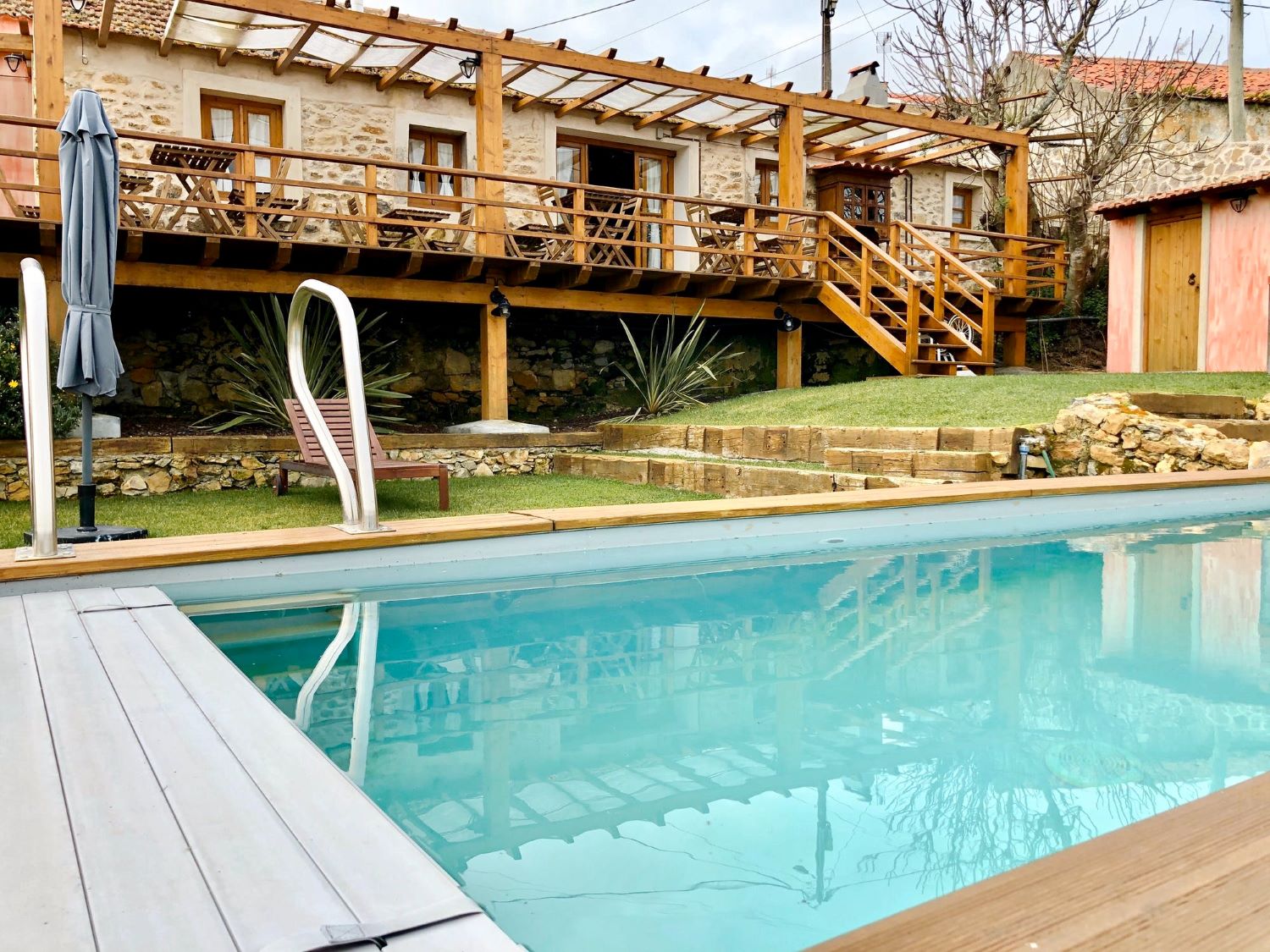A vacation rental agreement or short-term rental agreement is a lease contract between a tenant and a landlord. It outlines the exact terms of a rental period.
It's important to complete a rental agreement, even if the tenants will only stay for a short period. It protects guests and owners in case of cancellation or damages and defines their expectations.
Different Names for Short Term Rental Agreements
To avoid confusion, here are alternative names for short term lease agreements:
- Short-term residential lease agreement
- Vacation rental contract
- Short-term house rental contract
- Short-term rental agreement
- Vacation lease agreement
- Vacation rental short-term lease agreement
Periodic vs. Short-term Lease
While periodic and short-term leases are both offered to non-permanent tenants, they differ in a few ways:
-
Property Types
Most short-term leases are exclusively used for short stays and vacation properties. On the other hand, periodic leases are for those who may need to stay in a specific area for longer.
-
Rent Prices
Although the rental rates of both lease types are higher than standard leases, periodic leases have the highest rates as they're easy to terminate without notice.
-
Lease Term
A short-term lease has a set end date. But instead of leasing property for one year, the term is usually one month or week. On the other hand, a periodic lease (month-to-month) has no fixed end date and keeps renewing automatically until a party chooses to terminate it.
Despite their differences, periodic and short-term leases have a few things in common. They're mainly for furnished rentals, not for long-term or permanent renting, and rental rates are higher than long-term rentals.
Who Needs a Short-Term Rental Agreement?
As mentioned earlier, when defining a short-term vacation rental agreement, the contract is meant for both parties involved. The guest and host have different expectations and play different roles in a vacation rental contract, and here's how:
-
Host or Landlord
A short-term lease agreement holds you (as the landlord) responsible and accountable for your tenant's stay. The guest rental agreement clearly states your role to your tenant throughout their stay in the vacation home. For instance, if you have a specific process for handling check-out or have specific times they can contact you, ensure to let your tenant know this in the contract.
-
Guest or Tenant
A vacation rental agreement allows a guest or tenant to know what's expected of them (checking in and out, property care, and their overall responsibilities during their stay). It's especially essential if you provide alternative vacation rentals, such as a treehouse or yurt, that might require specific instructions for proper use or extra care.
When Do You Need a Short-term Rental Agreement?
A short-term rental agreement is essential when leasing a furnished rental property for a short period. However, it’s common to use this lease type to rent out a property for short visits or vacations of a few weeks or days.
If you use online rental platforms like VRBO or Airbnb, you might need to make a rental agreement, such as an Airbnb rental agreement. It might not be required, but it's always a great idea to have extra legal protection when a dispute comes up.
If you rent a vacation property for over 14 consecutive days, you'll be required to pay tax on the rental income. Hence, it's crucial to get detailed short-term agreements, especially if you're trying to claim deductions on business expenses or prove tax exemptions on your rental income.
Why Do You Need a Short-Term Vacation Rental Agreement?
While it may sound cumbersome, getting a vacation rental contract is vital for your business, yourself, and the tenant. Several property owners shy away from having a legally binding agreement due to the time-consuming and tedious paperwork. Though it may take some initial effort, the payoff is well worth it. Here are some reasons for signing a vacation rental agreement.
-
Collect Payments and Fees Without Any Issue
Many hosts prefer to style their guest's stay using an "a-la-carte" method. Instead of adding extra services to their stay, the host includes additional charges at the guest's request.
When guests agree to the extra charges in the short-term rental contract there is no confusion.
That way, you can collect payments more quickly as the agreement states that they decided to pay the extra charges. You won't have to go through the trouble of justifying the charges or chasing down your tenants to pay.
-
Only Host Suitable Tenants
Remember that the short-term rental agreement serves as a guide for the expectations of the landlord and the tenant. It provides a detailed profile of the kind of guest you want.
Ultimately, you want tenants that are a good fit for the home to ensure maximum satisfaction for everyone, including you. Writing the trip guidelines in a vacation rental contract will help ensure that you only host tenants suitable for the property, saving you from subsequent negative reviews and headaches.
-
Protect Your Property
Some property owners might wonder if their vacation home rules are effective. House rules will help keep your tenant informed about how they should handle your property, but it doesn't bind them by law. Instead it's more of an outline of your expectations than a formal contract to keep them adhering to your rules.
The vacation agreement is a formal way to inform your tenant about the rules and protect yourself if they don't follow them. You'll have it on paper that they consent to the expectations and property rules, and if they breach the agreement, you'll have proof that they did so. It's especially crucial if you're filing a claim through third-party insurance or an OTA, as they'll need to see as much evidence as possible.
-
Set Expectations
You want your tenant to consider you a good landlord. However, missed expectations and misunderstandings occur. Each vacation property is different, and guests often bring previous standards into their current spaces.
Perhaps they had an airport pick-up or room service at their last accommodation, but what if you don't provide such at your vacation rental property? Clarify things, so their expectations do not exceed what you are able to offer.
Conversely, it also enables your guests to get the most out of their vacation. Guiding your tenant about their stay through an outline in the vacation rental contract makes it easier for them too!
A short-term rental agreement is meant to keep the landlord and tenant on the same page, which can save you a lot of trouble later. Suppose something happens to the vacation rental property due to your tenant's mismanagement. A vacation rental agreement will provide a legal standing and some weight to resolve the problem if necessary.
Essential Things to Include in Your Vacation Lease Agreement
The terms to include in a short-term rental agreement depend on your property's specific situation. However, certain things need to be present in every agreement. Here are some common elements to include in a short-term rental agreement.
1. Details of the Rental Party
List all the guests who'll stay at the property during the rental period. Ensure to include each guest's phone number, full name, and current home address. You might also need to write the effective date (when the short-term rental agreement becomes valid).
2. Rental Property Details
Give a detailed description of your rental property. Explain every amenity included in the vacation rentals. Make sure to use unambiguous language.
3. Maximum Occupancy
This section limits the number of tenants or guests allowed to stay at the property. Make sure you define each guest's sleeping arrangements. Remember to justify the maximum occupancy number by including the fire code rules.
Specifying the maximum occupancy protects you if your tenant brings other individuals to the property unannounced. The guests will also be liable if the unauthorized visitors cause damage or suffer injuries.
4. Rental Period
Here's one of the most crucial sections of a short-term lease agreement. Your agreement should include the arrival and departure date. If you adjust the dates before your guest's arrival, they'll need to sign an updated guest rental agreement.
5. Rental Rules
This clause is vital for all vacation rental agreements as it clearly outlines the home rules. Some of the restrictions and regulations you can consider stating are no-pet or no-smoking policies. If there are any penalty fees, also ensure to communicate them in this section.
6. Fees
Several landlords charge additional fees. Ensure to define the required payment dates, cost, and purpose of any extra fees charged outside the security deposit and rent.
7. Payment Details
This section covers everything related to payments. Include the payment due date and the rental rate. Also, describe the other services you offer. For instance, explain the details here if you provide breakfast, transportation, or guided tours.
8. Guest's Access
This section defines how your guest will gain entry to the property. If the owner has a lockbox or key policy for guests to follow, they need to explain it in the short-term rental agreement.
9. Security Deposit
Security deposits protect you in case a tenant damages your rental property. You'll need to return the deposit when the guest leaves, provided there are no problems. Before choosing a security deposit amount, make sure that it's not too different from what other landlords in your community charge.
10. Cleaning
This section outlines what the cleaning fee covers. Make sure you also give instructions on how you want your guests to leave the property after departing.
11. Furnishings and Amenities
List all the amenities available in your home. Explain everything from your air conditioner to TV, furniture, and linens. Make sure you also mention the outdoor areas your tenants can access.
12. Cancellation Policy
This section explains how a tenant can cancel the short-term rental agreement. Hosts usually require tenants to write and submit their cancellation requests.
13. Limitation of Liability
Injuries and accidents can occur regardless of how well you maintain your home. The liability clause limits your responsibilities if this happens, and it also limits the amount you'll pay if your short-term tenant suffers a loss during their stay.
The clause must be carefully drafted and reasonable, so you might need to consult a real estate lawyer to help review the terms. Here are some vital elements you must include in this section:
- It should outline the specific losses you or your guest won't be liable for.
- It should mention the losses you or your guest will accept.
- It should define the statutory limit for your guests to make claims against you.
In any case, make sure you have insurance to avoid bearing the costs if any unpleasant situation occurs.
14. Extra Clauses
You can include extra clauses in the short-term vacation rental agreement to further limit what tenants can and can't do during their stay at your home.
You can define any parts of your property in the extra clause that you don't want the guests to access. For instance, you can restrict them from gaining access to a particular room or the pool area.
15. Violation of Agreement
Your short-term rental agreement should have a section that explains the consequences of either party violating the agreement. The homeowner can support their right to cancel a guest's stay if they break the terms.
How to Write a Short-term Vacation Rental Agreement
Here are some vital steps you can follow to create a vacation rental contract for your rental property.
Step One: Check Local Requirements
Check all local laws on vacation rentals before starting. Vacation rentals have specific requirements and are taxed or restricted in some areas. For instance, Austin City in Texas requires a vacation rental license before you can rent out your home for less than one month.
Step Two: Assess the Liability
You might need to consider an increased risk of degradation or damage to your rental property due to guests' frequent usage of the property. Consider creating an LLC or updating your insurance policy for the property to protect your assets and limit personal liability.
Step Three: Describe the Amenities and Property
The rental contract should include the property type (apartment, house, etcetera), property address, and the public and private facilities accessible to the guests during their stay. You can also list the amenities available on the property, including:
- Towels and linens
- Wifi
- Parking
- Basic cooking supplies
- Hot tub or swimming pool
- Washer and dryer
Step Four: Write the Tenant's Information
Write the property owner's contact details and full name, as well as the names of your tenant (the individual signing the vacation rental contract with you) and every member of the rental party.
It helps ensure your home doesn't accommodate more than the maximum occupancy, allowing you to respond accordingly or charge a fee if they bring in any additional occupant whose information isn't in the contract.
Step Five: Outline Policies and Rules
State your policies and rules regarding the following:
- Maximum occupancy
- Visitors
- Cancellation
- Pets
- Damage to belongings and property
- Smoking
Include specific penalties (such as termination of the short-term rental agreement or fees) if the guest doesn't comply with the policy and rules.
Step Six: Describe the Check-in and Check-out Process
Write the check-in time and arrival date in the vacation agreement, and describe how the tenant can access your property.
Also, explain the check-out process — key drop off, check-out time, and cleaning (if any) expected of the tenant before they leave. If the tenant requires a key to enter your property, note the fees related to lost keys in your contract.
Step Seven: Include Your Payment Details
Your vacation rental agreement should outline the rental cost (total amount due and rate) and a breakdown of cleaning fees, local taxes, and other applicable fees. Include an acceptable payment method (check transfer, cash, etcetera) and the due date for payment.
It's a fantastic idea to request a security deposit, which protects you in case of a last-minute termination. Typically, the tenant pays a security deposit while making a reservation, and the homeowner deducts the deposit from the total amount or refunds it at check-out.
Depending on the cancellation policy, the owner might offer guests a full or partial refund of their deposit if unforeseen circumstances happen (such as severe weather change) or they cancel with adequate notice.
Step Eight: Sign the Contract
Both parties can date and sign the contract after the guest reads and agrees to the rental agreement terms. Give the tenant proof of payment (if they paid a security deposit) and a copy of the rental agreement.
Consequences of Not Having a Short-Term Rental Vacation Agreement
Vacation rental contracts define the responsibilities and rights of both guests and hosts. It helps you to avoid conflicts after and during the tenant's stay. Some of the most common issues that a vacation lease agreement can protect you from include:
-
Guests Unwilling to Leave
Some guests who refuse to leave are a common short-term rental problem. Having a vacation rental contract in place gives you extra leverage if you need to evict the guest through the courts formally.
-
Tax Consequences
The IRS (Internal Revenue Service) provides a 14-day short-term rental exemption. It implies that if you lease your home for not more than 14 days in a year, you won't have to pay tax on the rental income. Conversely, if you're required to pay tax on a rental income, you can deduct the rental expenses like mortgage interest and property tax.
Make sure to record the dates you leased out the property to prove your rental income as non-taxable or taxable to the Internal Revenue Service. If the IRS audits your finances, having a short-term rental agreement will provide the required proof.
-
Damaged Property
Short-term rental platforms like Airbnb have insurance to cover damages caused by your guests. However, a vacation rental agreement comes in handy when you wish to make claims with your insurance company.
-
Airbnb Doesn't Cover Claim
If you make claims to Airbnb after an incident occurs, your claim can go beyond Airbnb's support team. If their standard policies don't have provisions for that particular case, you can use a short-term rental agreement as proof in court.
-
Expensive Attorney Fees
If you don't have documentation to support your case, you'll have fewer chances of winning a claim against your guest. Besides, not having a short-term rental contract in place means an attorney will need more time to determine who's liable and argue your case.
Final Thoughts
Using a short-term rental agreement will protect you, your guests, and your property. It's worth the long-term result as your business remains safe from any issues. Now that you've discovered the benefits of having a rental agreement, consider signing one as soon as possible.
If you might want to learn more about short term rentals and how to add a rental to your investment portfolio, you can visit the Short Term Shop to learn more about short-term rentals in the US.






